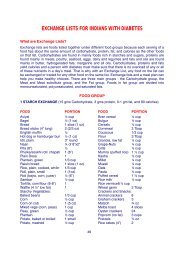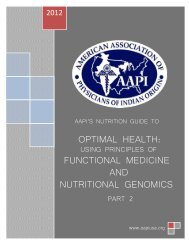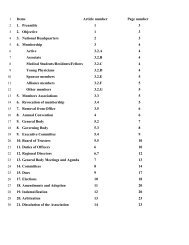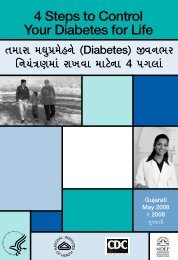functional medicine and nutritional genomics - American Association ...
functional medicine and nutritional genomics - American Association ...
functional medicine and nutritional genomics - American Association ...
You also want an ePaper? Increase the reach of your titles
YUMPU automatically turns print PDFs into web optimized ePapers that Google loves.
AAPI’S NUTRITION GUIDE TO OPTIMAL HEALTH: USING PRINCIPLES OF FUNCTIONAL MEDICINE AND NUTRITIONAL GENOMICS<br />
A short-term elimination/challenge diet involves<br />
two basic steps: Eliminate the suspected food from<br />
the child’s diet for at least 2 weeks. This will<br />
give the child’s allergy symptoms time to subside.<br />
If the child has EE, EG, <strong>and</strong>/or EC, the<br />
suspected food allergens need to be eliminated for<br />
8 to 12 weeks to achieve symptom improvement.<br />
The first foods eliminated are those that had<br />
positive IgE RAST <strong>and</strong>/or skin prick test results. If<br />
both of these tests were negative, eliminate the<br />
most common allergenic foods: milk, wheat, soy,<br />
egg, peanuts, nuts, fish, <strong>and</strong> shellfish. The<br />
challenge phase involves reintroducing the<br />
eliminated food back into the diet <strong>and</strong> observe for<br />
recurrence of allergy symptoms.<br />
An excellent resource of educational materials <strong>and</strong><br />
more detailed information related to food allergies,<br />
including list of foods <strong>and</strong> ingredients to avoid can<br />
be found on the Food Allergy <strong>and</strong> Anaphylaxis<br />
Network (FAAN) Web site at www.foodallergy.org.<br />
A referral to a Registered Dietitian is necessary to<br />
assist parents in implementing the<br />
elimination/challenge diet; parents should not<br />
attempt to implement this diet on their own.<br />
Identifying which foods a child may react to is<br />
complicated, test results are difficult to interpret,<br />
Elizabeth Strickl<strong>and</strong> is a Registered Dietitian<br />
specializing in integrative Nutrition Therapy for<br />
infants, children, <strong>and</strong> young adults with<br />
developmental disabilities, chronic illnesses, <strong>and</strong><br />
special health care needs. Elizabeth’s area of<br />
expertise includes Autism Spectrum Disorders.<br />
She has over 30 years of experience ranging<br />
from providing individual Nutrition Therapy, training<br />
professionals <strong>and</strong> parents, <strong>and</strong> coordinating<br />
Nutrition Services statewide for children with<br />
disabilities.<br />
Elizabeth is the founder of ASD Nutrition Seminars<br />
& Consulting, a clinical nutrition consulting firm<br />
that serves families, professionals, educational<br />
systems, <strong>and</strong> private <strong>and</strong> government programs.<br />
Her work exp<strong>and</strong>s nationwide to include providing<br />
individualized nutrition therapy to children with<br />
autism <strong>and</strong> related disorders.<br />
131<br />
current blood lab <strong>and</strong> skin tests are not always<br />
accurate, some allergy tests are controversial, <strong>and</strong><br />
treatment is challenging. Even so, identifying <strong>and</strong><br />
treating the child’s food reactions has enormous<br />
benefits. The child will experience a wide range of<br />
physical, gastrointestinal, behavioral, <strong>and</strong><br />
neurological improvements. Identifying problematic<br />
foods is a critical step in <strong>nutritional</strong> treatment for<br />
a child with autism.<br />
SUMMARY<br />
Integrative <strong>nutritional</strong> interventions can have a<br />
major impact on a child with autism. Use of<br />
whole foods, <strong>nutritional</strong> supplements, natural<br />
healing of the gut, <strong>and</strong> eliminating problematic<br />
foods are essential in restoring the child’s<br />
<strong>nutritional</strong> health. Although it varies for each<br />
individual child, after implementing appropriate<br />
nutrition interventions, one may expect to see<br />
improvements in the child’s behavior, mood,<br />
aggression, impulsivity, learning, attention,<br />
language, focus, eye contact, sleep difficulties,<br />
gastrointestinal problems, growth, <strong>and</strong> overall<br />
health. Registered Dietitians play a key role in<br />
incorporating nutrition therapy as a component of<br />
the child’s comprehensive treatment plan.<br />
Elizabeth is a published author, the title of her<br />
book is ‚Eating for Autism … The 10-Step<br />
Nutrition Plan to Help Treat Your Child’s Autism,<br />
Asperger’s, or ADHD‛. She is a member of the<br />
Dietitians in Integrative <strong>and</strong> Functional Medicine<br />
Dietetic Practice Group of The <strong>American</strong> Academy<br />
of Nutrition <strong>and</strong> Dietetics.<br />
Elizabeth earned a Bachelor of Science degree in<br />
Dietetics from Louisiana State University <strong>and</strong> a<br />
Master of Science degree in Nutrition from the<br />
University of Georgia. She completed Post<br />
Graduate training on Nutrition Therapy for Children<br />
with Special Health Care Needs.<br />
Contact Elizabeth Strickl<strong>and</strong><br />
at ASDpuzzle@aol.com or 830-237-2886<br />
Website: www.ASDpuzzle.com<br />
References:<br />
2012

















